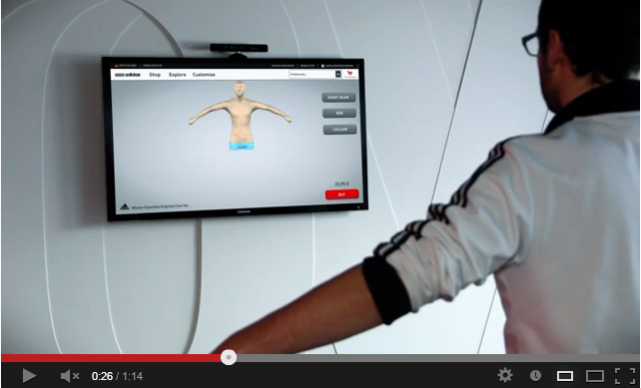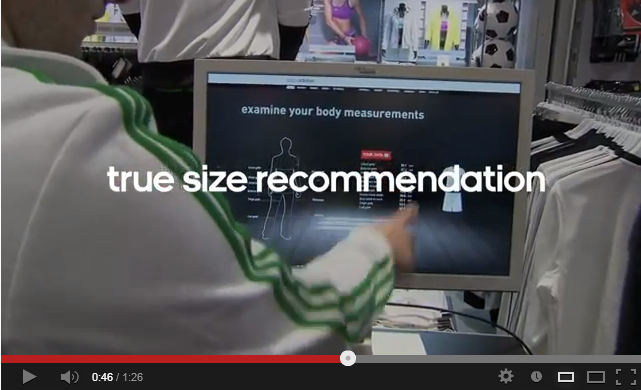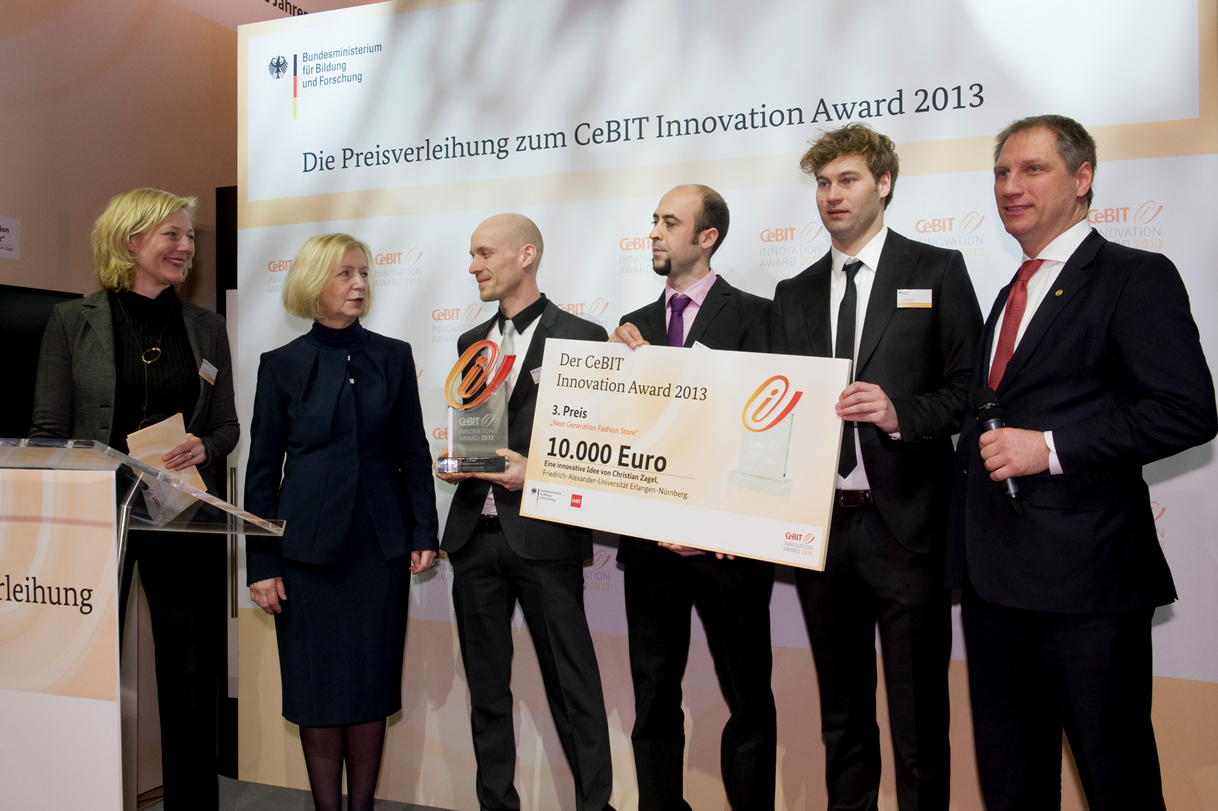
© Bundesministerium für Bildung und Forschung
‚BodyKinectizer‘ and ‚CyberFIT‘ innovations win award
In cooperation with the trade fair organiser Deutsche Messe AG, the Federal Ministry of Education and Research (BMBF) presented the ‚CeBIT Innovation Award‘ for the very first time at CeBIT 2013. The award is directed at young researchers and given for innovations that distinguish themselves by having the greatest possible user-friendliness and provide easy, intuitive interaction with IT systems.


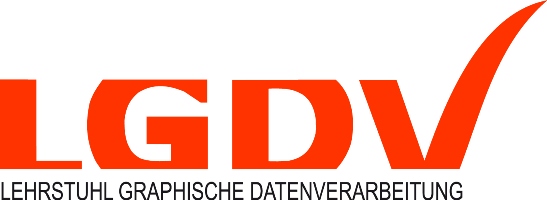
In collaboration with our long-standing partner, the adidas Group, and the Computer Graphics Group Erlangen, it was possible for the Chair for Information Systems to make a convincing impression in the services sector with two of its innovations, coming in third place in the competition.
„Next Generation Fashion Store“
The award-winning innovations were ‚CyberFIT‘, an interactive changing room, and‚BodyKinectizer‘, a cost-effective body scanner based on a Microsoft Kinect console. Both innovations constitute the ‚Next Generation Fashion Store‘ and are part of the research project “Service Fascination“. They set the trend, pointing the way forward for future store concepts and sales strategies in the apparel industry by placing the customer centre stage. The ‚Next Generation Fashion Store‘ is directed in particular at the digital generation (so-called ‚Millennials‘) with the aim of creating a completely new shopping experience in an innovative environment that excites consumers and offers added value.
CyberFIT
– an interactive changing room for a first-class shopping experience –
Changing rooms are an essential element in brick-and-mortar retail. And yet despite their huge importance for customers and companies, they have hardly changed their look and functionality in the past few decades.
The „CyberFIT“ project brings to life an interactive changing room based on a combination of innovative technologies, such as RFID sensors, and touch-sensitive surfaces and by generating an immersive virtual environment with a ‚powerwall‘ (a type of mega-monitor). Besides lending support to customers in the process of trying on and purchasing items by providing detailed product information, the system also connects customers to independent recommendation systems. Moreover, a connection to social networks makes it possible for customers to include their friends in the whole shopping experience and give their own feedback on products. With a clear focus on all dimensions of customer experience and by taking into consideration the focus groups of various product categories, it is possible to generate a unique shopping experience which excites customers and encourages them to come back.
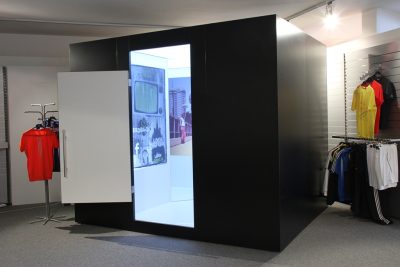
Three walls each displaying projected images create an immersive environment and provide the item of clothing taken into the changing room with a complementary product backdrop. For example, if a customer takes an outdoor jacket into the changing cubicle, images are projected onto the powerwalls to create a mountain landscape setting, which is accompanied by appropriate background sounds.
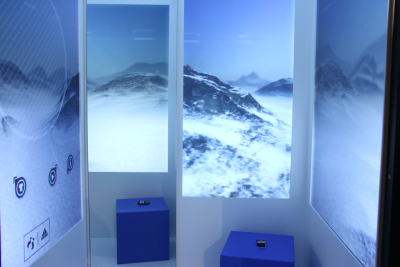
Customers are also offered a portfolio of functions, depending on the product, as well as the respective product category and customer focus group. The individual applications offer the user the option of pulling up additional product information, playing product and marketing videos, viewing outfit combinations and posting product evaluations.
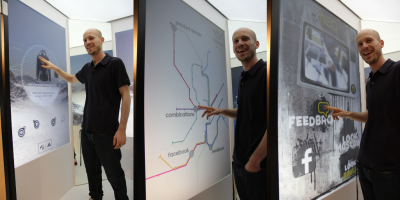
Being connected to social networks allows customers to engage their family and friends in the shopping experience. Using their own smartphones, customers can post their comments and a link to the product currently selected in the online shop.
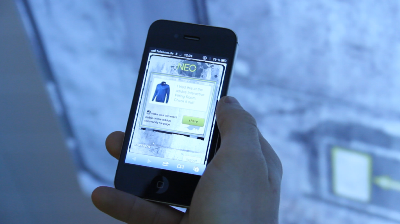
Watch CyberFIT in action:
Project partners for „CyberFIT“:
BodyKinectizer
– a full-body 3D scanner for the living room and brick-and-mortar retail –
Avatars traditionally use digital images of real people in the virtual world of computer technology, e.g. as in computer games and online chats. Up to now, creating realistic and, in particular, three-dimensional avatars has involved a great deal of effort and expense. In particular, the digitisation of the user’s body at home using the hardware available continues to pose a huge challenge.
The ‚BodyKinectizer‘ is a cost-effective 3D full-body scanner based on time-of-flight cameras. It can create an exact 3D image of the human body within just a few seconds. The fully automatic body measurement system offers a variety of applications, for example in the sporting goods industry, in the fashion industry and in health care. An additional procedure makes it possible to dress the configured body image with digital clothing and to animate it in real time. As it is easy to use and cost-effective, this 3D scanning technology can be made available to a wide audience.
Two versions of the „BodyKinectizer“ have been implemented: one version for using at home and one professional version for use on mobile devices and in brick-and-mortar retail.
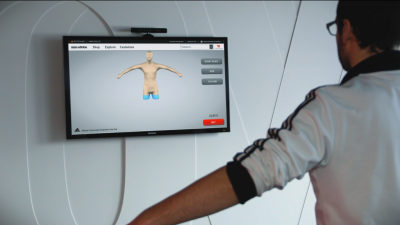
The home version can be used by an individual person on his/her own. After taking up your initial position, the scanning process is fully automatic. This method makes it possible to create a high-quality, digital body image of the customer by using just one single scan.
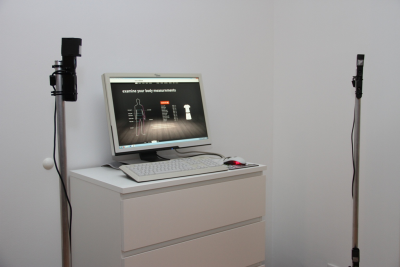
The professional scanner is directed at brick-and-mortar retail and, by using several time-of-flight cameras, offers a particularly quick and precise image of the avatar. Despite its high resolution, the creation process takes less than ten seconds.
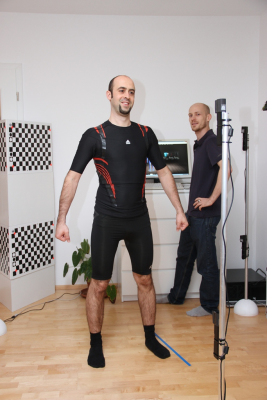
The 3D image of the avatar is displayed on an attractive user interface and gives both the customer and sales staff the option of pulling up measurements and garment size recommendations. The connection to a product database or e-commerce allows users to simulate trying garments on using their digital bodies.
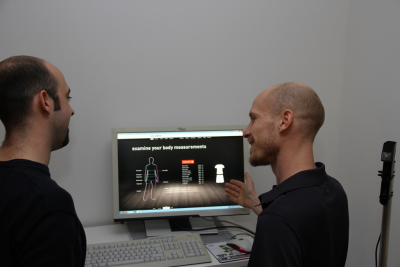
Watch the BodyKinectizer in action (Home & professional scanner):
Project partners of the „BodyKinectizer“:
Reasons for the ‚Next Generation Fashion Store‘ – background information
The development of both innovative concepts behind the ‚Next Generation Fashion Store‘ was driven by the following approach:
In our modern knowledge and service society, companies try to distinguish themselves above all by offering a wide variety of services. Often, these are furnished with technical refinements in order to stand out from the competition. Frequently in this context, the impact of psychological and emotional aspects, such as intuitive operability, user experience and enjoyment gained when using new media, is underestimated, with the result that the desired acceptance by users is not achieved. In particular with regard to the younger digital target group (the so-called ‚Millenials‘), offering innovative applications is key to successfully outperforming the competition. The effects to expect range from increased sales and higher customer loyalty to generating a positive brand experience by recommendations spread by word of mouth.
Experts and support behind the scenes
The realisation of the ‚Next Generation Fashion Store‘ and the fantastic success of having been presented with the CeBIT Innovation Award 2013 go back to the support of numerous experts who made it all happen. Our sincere thanks go to:
- Jan Brecht, Prof. Freimut Bodendorf, Prof. Günther Greiner und Prof. Marc Stamminger
- Frits Reneman
- Sören Schmidt
- Jacques Ohannessian
- Stanislav Goussev
- Florian Fick
- Sebastian Kolb
- Matteo Colaianni
- Adrian Rodriguez
- Stefan Heckl
- Daniel Protogerakis
- Christoph Heim
- Christian Heckl
- Metrilus GmbH
Related publications:
- Malcher, L. (2012): Konzeption einer interaktiven Umkleidekabine im Kontext der Customer Experience, Diplomarbeit
- Zollhöfer, M.; Martinek, M.; Greiner, G.; Stamminger, M.; Süßmuth, J. (2011): Automatic Reconstruction of Personalized Avatars from 3D Facescans, in: Proceedings of Computer Animation and Virtual Worlds (CASA 2011), 22, Nr. 2-3, S. 195-202.
- Zagel, C.; Süßmuth, J., Bodendorf, F. (2013): Automatische Rekonstruktion eines 3D Körpermodells aus Kinect Sensordaten, in: Proceedings of the 11th International Conference on Wirtschaftsinformatik, Leipzig, S.551-564.
- Zagel, C.; Bodendorf, F. (2012): User Centered Design of Innovative E-Service Solutions – A Scientific Approach to User Fascination, in: Proceedings of the 2012 Annual SRII Global Conference, IEEE, San Jose, S. 697-704.






